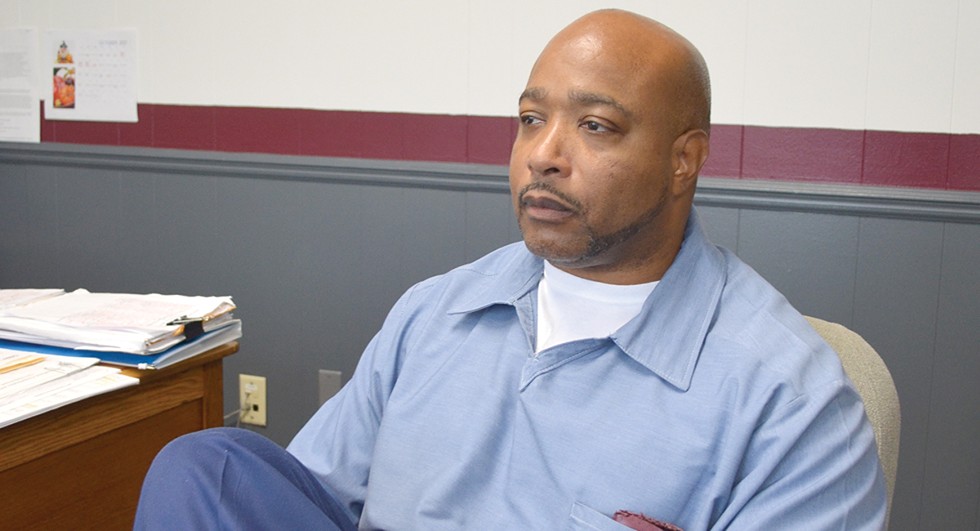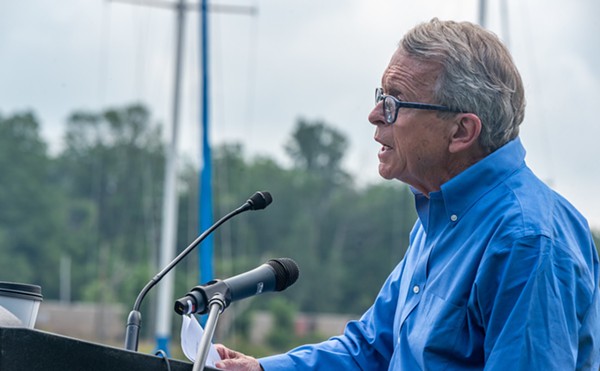In May 2018, Charles Keith appeared on The Breakfast Club on Power 105.1 in New York City. The man from Canton, Ohio, had traveled to the big city to tell the same story he's been telling for 25 years — how his brother, Kevin, was wrongfully convicted of three murders in 1994 and sentenced to death.
In the studio, the hosts seem incredulous. Charles understands this. And why not? Through husky baritone and well-worn turns of phrase, the story he's telling is one of broad abuses of local political power, deep trenches of concerted police coverups and the dramatic consequences of structural racism in the American criminal justice system. "They tried to use the death penalty to commit judicial murder," he tells Charlamagne tha God, as he's said for years to anyone who'd listen.
If it weren't for the trove of public records and circumstantial evidence uncovered in the intervening quarter-century, the story of Kevin Keith would be nearly impossible to believe.
Charles was joined in the studio that day by Lori Rothschild, a documentary filmmaker who runs Big City TV in Los Angeles. She's been heavily involved in the story since late 2017, when a Scene feature skipped across her inbox and the compelling tension in Kevin's case drew her into the intrigue of rural Ohio criminal history. She's developing a 10-hour series called Proving Innocence: Kevin Keith vs. The State of Ohio. Production is under way, but questions remain. What exactly happened in this case? And how's it going to end? (Kevin's sentence was commuted in 2010, and he has been incarcerated at the Marion Correctional Institution ever since.)
The Breakfast Club airtime delivered perhaps the largest single-event audience that Charles had secured in his 25-year effort to bring his brother's case to the public. Indeed, for Charles and the team of attorneys who've worked to uncover evidence and keep Kevin's name in the judicial consciousness, the curve of public attention on this case is beginning to turn sharply upward.
Then, of all the possible twists in this dirgeful drama, Kim Kardashian West walked into the story.
In mid-July, Kardashian brought the force of her celebrity onto Kevin's case with a series of social media posts: On Twitter and Instagram, she shared the Scene story along with updates about the documentary and the research that Rothschild's team had developed over the past year and a half. This is no small thing. This is a global endorsement to pry open the doors and give this case a thorough look-see from the curious masses.
"I heard about Kevin Keith's case last year & the more I learn about it, the more I believe the world needs to hear what happened to him! He was on death row & came w/in days of execution before the governor of Ohio commuted his sentence to life w/o parole," Kardashian tweeted. She has joined Proving Innocence as an executive producer.
The story of what happens to Kevin now is one of both mass media — the documentary, The Breakfast Club, Kim Kardashian's celebrity —and of incremental notches through the courts. Through it all, Charles' message is constant.
"It's not about him," Charles tells The Breakfast Club hosts, referencing his brother. "It's about how the police set it up and allowed it to happen."
Kevin, 55, is once again in federal court — an astounding feat for a team of attorneys that has gathered more and more evidence over the years and pounded back against the state's stubborn unwillingness to re-examine an old conviction. With each new chapter, it seems, more people are following Charles down the rabbit hole that begins in Bucyrus, Ohio, circa 1994.
"I had to investigate for myself that I could actually take this on," Rothschild tells Scene. "Usually when you look into wrongful conviction cases, and I get a lot as a crime producer ... I usually would look at it and the rabbit hole would go dark very quickly. And I couldn't find my way out of it. In Kevin's case, every time I dug there was another hole that opened up.
"It's also important to know that we have the opportunity, sitting here in 2019, to have the entire story in front of us," she says. "When Kevin got convicted and sentenced to death within 100 days, Charles started with nothing. He started with: 'How the heck did that happen?'"
* * *
The story of the Bucyrus murders has lurked just beneath the surface of 25 years of judicial careers and political maneuvering in Ohio. This state isn't exactly short on dubious convictions and formal exonerations, but Kevin Keith's case has remained an enduring question mark on the great narrative of Ohio power. People who travel in this world are familiar with Kevin Keith.
And so, if the weight of the justice system means anything, then why all the hand-wringing and second-guessing from respected public officials and legal experts?
We laid out the shape of the criminal case and its tangential Crawford County history in our 2017 story, but here's the briefest of summaries again: On Feb. 13, 1994, a man shot and killed two women and a young girl in a small apartment in Bucyrus, Ohio (west of Mansfield). A man and two children survived. The victims were related to a known drug informant who'd been working for local detectives tasked with overseeing a sprawling pharmacy burglary ring. The ringleader of the pharmacy break-ins, who'd go on to be convicted the following year, said he'd been given $15,000 to "cripple" the snitch behind a recent drug bust. The detectives knew this, and yet they showed up at the Bucyrus apartment on the night of the murders and began mixing Kevin's name into the nighttime conjecture. Two days later, police officers arrested Kevin Keith.
"What we have is some evidence that we have collected that we hope we will be able to link him to the crimes," Bucyrus police chief Joseph Beran said Feb. 16, 1994. Through years of court records, judges have repeatedly attested that no physical evidence ties Kevin to the crime; however, no alternate suspects were ever identified or investigated.
It's not common in our warp-speed digital media environment to find the space in a newspaper to examine the incremental movement of a civil case in federal court. After Scene published its lengthy feature on what had happened in Bucyrus in 1994, it was clear that the story would continue. Here's the story we've been working on, but, okay, what comes next?
This question haunts journalists, and it's rarely answered satisfactorily. If the criminal justice system is conveyed to the public as a Byzantine network of personalities and institutions — the creative morass of an occasional 5,000-word feature story in the paper — well, then the post-conviction criminal justice system often isn't conveyed at all.
Kevin has filed four habeas petitions — legal documents used to reexamine whether a conviction and subsequent incarceration is lawful, often in light of new evidence that may not have been available (or shared with the defendant in the first place) at the original criminal trial. Habeas corpus means "You shall have the body" in Latin. In 2008, in response to Kevin's second habeas petition, the Sixth Circuit Court of Appeals laid out the five points of "core evidence" supporting the conviction — the pillars of the case that Keith's habeas petition would need to impeach. These points included:
1.) Surviving witness Richard Warren's testimony, provided under duress;
2.) Bucyrus Estates neighbor Nancy Smathers' testimony, in which she had identified Kevin on her third conversation with police (and only after seeing Kevin on TV);
3.) The "043" segment of the license plate imprint left in a snow bank by the getaway vehicle, which numerals appeared in both the pharmacy burglary ringleader's license plate and in Kevin's girlfriend's grandfather's license plate;
4.) A bullet cartridge found outside a McDonald's that Keith was known to frequent;
5.) The January 1994 drug bust that connected Keith (and eight other individuals) with known snitch Rudel Chatman (the likely intended target of the murder).
Five points. That's the state's prosecution of Kevin Keith. In his 2008 petition, Kevin filed evidence that had been withheld from him during his 1994 trial. That evidence included documents that pointed to an alternate suspect and records that showed how police guided Warren in his testimony against Kevin.
In his 2018 habeas petition, Keith focused his claims on the state's Bureau of Criminal Investigations forensic scientist Michele Yezzo, whose career was cast into doubt when a separate lawsuit against the state of Ohio uncovered damning evidence against her integrity and professionalism. Keith also used his 2018 petition to zero in on a 1994 subpoena for Bucyrus phone records — police station call logs that would have discredited the police investigation. They were found to have "Ignore for now" written on them.
"The state did not provide any of this evidence to Keith prior to his trial," the Sixth Circuit three-judge panel wrote last year. "Yezzo's testimony was particularly important because no physical evidence linked Keith to the murders."
"This new evidence goes to the 'core' of the government's case," the court writes. "The 'core of the case' can safely be said to be the 'evidence as a whole.'"
Now, Kevin is awaiting word from Judge Solomon Oliver. This could mean a new trial or something else altogether — or nothing at all. The petition could be dismissed outright. But one thing's for sure: Kevin's never found himself in this position before.
* * *
This sudden spotlight on a 25-year-old murder case in Ohio is not Kardashian's first foray into the American landscape of questionable criminal convictions.
On June 6, 2018, President Donald Trump commuted Alice Marie Johnson's life sentence and set her free. Johnson had spent 21 years in prison for her role in a cocaine trafficking ring. Kardashian's advocacy on this matter was widely credited for the president's relatively swift action. (Johnson's commutation was part of a broader series of events that led to the bipartisan First Step Act, a bill that assists non-violent federal inmates reentering society.) The headlines were jarring, in a way. Kim Kardashian was involved? Donald Trump did what, again?
This summer, Kardashian is working not only with Kevin's case but also with a man named Kevin Cooper — a Death Row inmate in San Quentin. Cooper was convicted of killing four people in 1985. His case has garnered skepticism over the years, and new DNA tests have pushed his cause into the public eye in the past 12 months. No doubt, stories like Cooper's, Johnson's and Kevin Keith's are part of a broader wave of national interest in true crime drama and political corruption: human tragedy boiled down to a televised understanding of right and wrong.
To further hone her criminal justice inclinations, Kardashian has been apprenticing with attorneys in California. In that state, law school isn't required; regular citizens, even the most world-famous of them all, can work under professional attorneys and study for the bar exam. Earlier this year, she took the state's "baby bar exam," a mandatory sort of practice run for the full test.
"I knew that by bringing on someone like Kim with her interest in this space of criminal justice reform, I knew that it would give the case the attention that it deserves," Rothschild says. "Kim is nothing that I thought she was going to be and everything that I thought she was going to be at the same time. She and her family, obviously, are an open book to the world, that's just the way that they operate. And what I've always admired about her family and the brands in general, is that it's always blood is thicker than water: family first. And that always rang true for me with Charles and Kevin Keith as well. So, when I approached Kim, I knew that she would be intrigued by the case, because she really does appreciate cases like this and gets involved in them. But I also knew that she would see it for what it was, where there was this brother fighting for his brother."
For now, late in the summer of 2019, Rothschild's team is continuing to collect material for the documentary on a daily basis. Crawford County residents have come forward to share details of the case with her. The team is on the phone and on the ground, recording audio and video for the project and building a deep investigation into what really went down in Bucryus 25 years ago. "It's really been an ongoing production," she says. But while certain platforms have expressed interest in the series — including Netflix, Oxygen and OWN — executives haven't yet committed to anything.
"The reality is: Everyone wants an ending," Rothschild says. "They want to know how it's going to end."
That's the rub. As Kevin's attorneys plow through the incisive legal work of the habeas case, the only way for the general public to understand a case as complex as this or any other murder case is to explain the full story through journalism and, perhaps, a little documentary drama. When Charles says, "It's not about him," what he means is that there's a story here that has nothing to do with his brother. Kevin took the fall, but a thick web of police officers and drug dealers set in motion a violent vignette of rural Ohio life. It's a story.
"What my research staff can do is dig into little facets of the case that investigators either didn't have the time to do, or it doesn't really pertain to Kevin's innocence at this moment," Rothschild says. "So, you can really understand the environment that these people were living in, during that time in 1994 — what it felt like to be in Crawford County, what it felt like to grow up in Crestline and why the relationship between the police officers and these locals was strained and how that all worked. You can have that conversation in a longer documentary piece."
The latest movement on the federal court docket is an Aug. 16 motion for an evidentiary hearing. After an all-out paperwork war over this most recent habeas petition, Kevin's attorneys are seeking a chance in court to suss out the factual undergirding of the charges alleged in the stack of papers.
"While there are a significant number of issues on which the [state] and Keith disagree, those issues likely can be resolved by looking at the record evidence," Kevin's attorneys write.
Now, after 25 years of questions, more people than ever before are looking at the record evidence. With this latest motion filed in federal court and awaiting an answer, it's up to the state to look deeply at what's come before and what comes next in the story of Kevin Keith.















